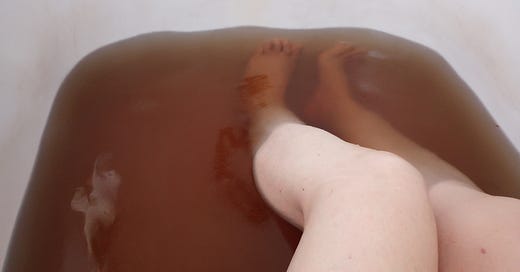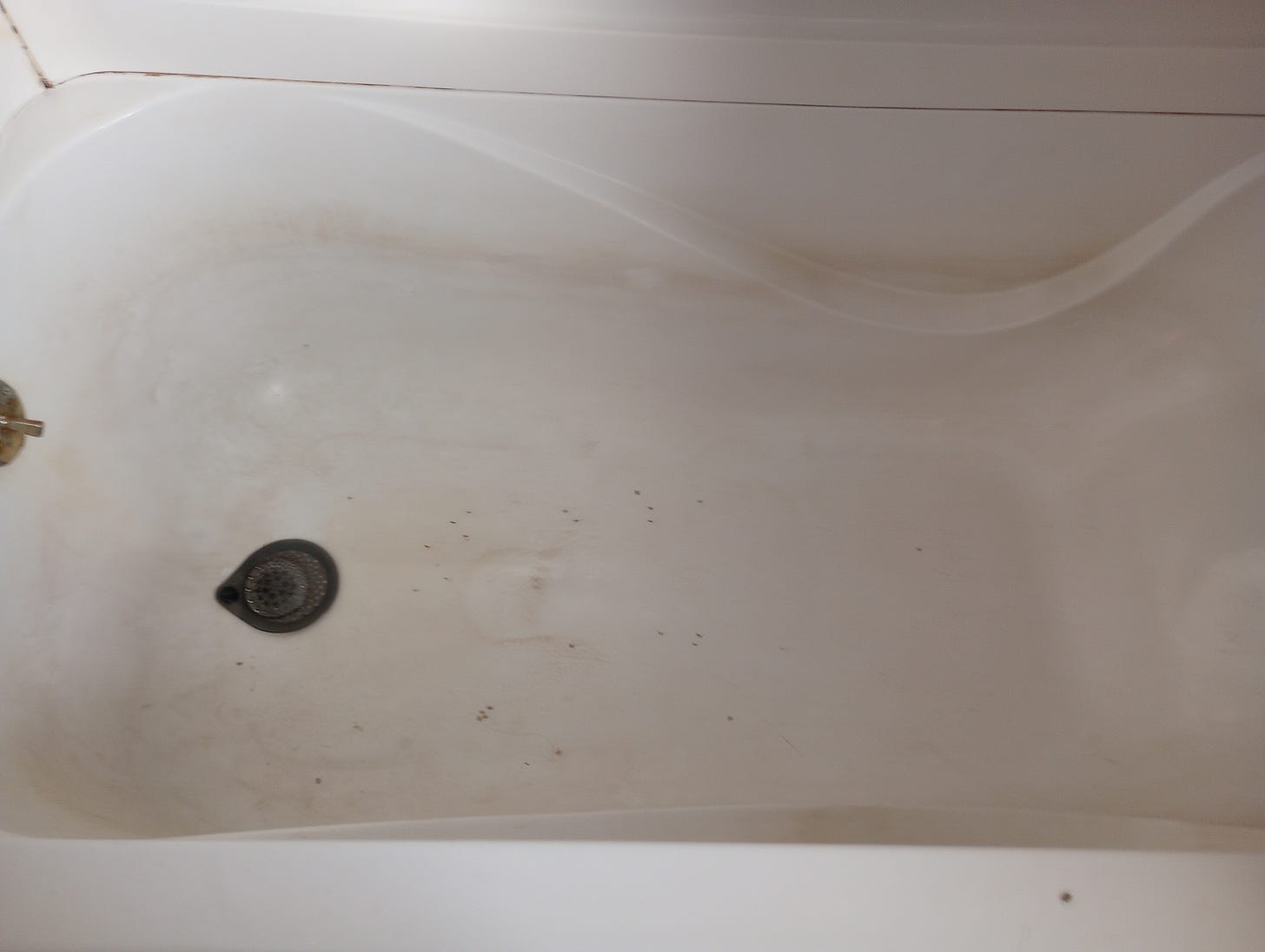Bath time and Journaling for habit change - example of how simple that can be.
*and my liver lab results - no hepatitis, but possibly autoimmune hepatitis.
My magnesium bath routine helps my health, preventing muscle cramps and anxious or irritated moods — but — I put it off or forget how long ago I took one. I seem to need one every five days or so, but not every seven days. Picking a standard day each week wouldn't be often enough.
Marking a calendar can help track a health habit and can be your own shorthand code. Note your code somewhere on the page in case you lapse for a while, it will be easier to start again with clear notes about the process you were using. “Journaling” has become kind of a big thing with workbooks to complete with prompts to guide you in ideas to write about. That all takes time and concentration and handwriting is recommended as it seems to connect with the brain better than typing or speaking into a recorder.
Do whatever works for you is most important - do what you will do. If a strategy doesn’t appeal to you then it may seem more like a chore than an aid to you. On the other hand, some digging into your issues can be helpful and is needed, but the method still needs to connect with you for you to use it, to stick with it. Journal prompts that you think about and talk about into a recorder may work for you.
Tracking a habit can be as simple as tally marks on a chalkboard or simple notes on a calendar and really isn’t the same at all as the journaling workbooks with prompts to think about. Logging a habit is simply collecting data about yourself. To track exercise, we might want to know how long and what type of exercise. Tracking more complex daily symptoms along with daily food intake and other habits still isn’t ‘journaling’ but would be complex enough to benefit from a preformatted page with the symptoms being tracked and room to write in foods and beverages.
Example code for a simple calendar logging system: W-15 = walked 15 minutes
In my image B around the calendar date = took a MgCl bath. Today I added a circled F for Fennel/Pom peel tea bath.

The skin can absorb nutrients and gain health benefits from phytonutrients. Fennel seed is good for hair and skin and congestion and pomegranate peel extract is also good for skin and wound healing as long as what you are using isn't too acidic.
I used about a half cup.of fennel seed and one sixth of as pomegranate peel rind sliced fine. Bring to a boil then let steep for 20 minutes. The bath was lovely. I feel good today and can breathe clearly.
Warning ⚠️ if you treat your bathtub like a teapot, it will look like a teapot.
OxyClean to the rescue. The bathtub is better but could use another try. Five days from now…

My Liver labs - I may have moderate autoimmune hepatitis. Okay.
Hepatitis simply means ‘inflammation of the liver’ and it can have different causes. My summer of excess salicylate might have been a factor and it was still not under great control on November 13th, January 2nd or 4th when I had blood work done.
My Acute Hepatitis labs were normal, some of the fibrosis labs were normal and others were off, and most of the autoimmune liver labs were normal except for “Anti-Smooth Muscle Ab by IFA” = 1:20 = HIGH. MedlinePlus.gov says that can mean there is a chronic autoimmune liver condition. My January 4th liver labs were still elevated but had dropped slightly from the Jan 2 labs. Getting the salicylate excess under control may help. Standard treatment for ‘autoimmune hepatitis’ is to shut down the immune system and I would rather skip that. Corticosteroids to shut down the immune system is a last ditch treatment that typically can only be used for about two years before major negative side effects start occurring - roughly.
My MCV and MCH were still elevated (103 and 34.6) but also dropped a tiny amount from the Nov 3 results (104 and 34.7). That is odd because my folate and B12 labs showed really elevated levels - my supplements. Why isn’t my body using them to make mature red blood cells though? (Hemoglobin in Nov - 12.6, hemoglobin in Jan 12.3) White blood cells - normal in Nov and Jan → no overt infection.
Fibrosis - “FIB-4 Index” was HIGH, 3.41 with a normal range of 0.00-2.67. My Albumin and Total Protein are low, Bilirubin, Direct - elevated (0.51; normal 0.00-0.40), while Bilirubin, Total was normal. APRI Index suggests I am approaching significant fibrosis but am not there quite yet, (1.5, above 1.5 is considered high risk, between 0.6 and 1.5 is ~ moderate risk; below 0.6 is called low risk; above 2.0 is high risk for cirrhosis).
So I do have liver issues but still in the earlier stages of chronic inflammatory damage. Fibrosis is a stage prior to death of numerous cells and irreversible organ damage. I do need to take it seriously, but I am not a person in need of emergency surgery.
Yes, I have no perforated bowel, omg, eyeroll, this post, I do not want to go back for an MRI, to be honest. They haven’t called to schedule one and I haven’t called them. I reached a point in the 6 hour wait in the Emergency Department where I decided that I didn’t want surgery, period. Consider me on Comfort Care - so there is no point in expensive tests to visualize my insides.
The surgical team really gave me the impression that they, and they alone, would be the deciders about whether I was going to have surgery or not - NO, I AM the DECIDER about my body. I have met too many sadists and control freaks to allow myself to be easily dominated by controlling people who may be sadists. *There is a higher percentage of psychopaths among surgeons and pediatricians than within the average population (Dutton). That doesn’t mean all are, just maybe a greater tendency. A more detailed look at different traits that may be part of psychopathy, found that “immunity to stress” is a more common trait among physicians and surgeons than in the average population. That is also a characteristic of psychopathy - staying calm in a crisis - which would be a handy trait for an emergency responder. (Pegrum and Pearce, 2015)
My other hesitation is simply based on perspective - I have noticed that people tend to see solutions that are within their own field, when maybe a different strategy might work better. I.E. - a carpenter may see where wood is the answer while a metalsmith might see metal as the solution. A nutritionist is likely to see how nutrients may help and a surgeon is very likely to see surgery as a solution to a problem - even though there might be other solutions that might work better.
Disclaimer: This information is being provided for educational purposes within the guidelines of Fair Use and is not intended to provide individual health care guidance.
Reference List
(Pegrum and Pearce, 2015) Pegrum, J., Pearce, O., A stressful job: are surgeons psychopaths?, The Bulletin of the Royal College of Surgeons of England, Sept. 2015, 97(8);331 - 334, https://doi.org/10.1308/rcsbull.2015.3 https://publishing.rcseng.ac.uk/doi/full/10.1308/rcsbull.2015.331








Please look at your diet re liver.
Get off all alcohol, avocado ( 70% fat), no fried foods at all.
Try fresh fruit and salads with no oil dressings for meals for a few months.
Vegan diets can be very very high in fats unbeknown to people and doctors don’t go near diets so it is up to you.
Drop the supplements for a few months.
Give the liver a break from all fats.
Find out acupressure points for your liver and kidneys to massage daily and practice deep diaphragmic breathing every night and morning in bed - 20-30 breathes.
Try using 20 mule team borax to clean your bathtub.